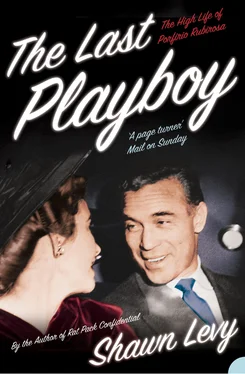When police and ambulance drivers arrived, they couldn’t at first make out what happened. Mrs. Higgs was so frightened that she couldn’t bring forth any English and insisted that she’d been robbed until a detective found her jewelry brewing with the coffee. Bencosme, barely conscious by the time he was taken off to Knickerbocker Hospital, muttered that he was a political refugee. Only when Morales returned home at midnight to find the chaotic scene did a reasonable theory of the case emerge: Somebody had tried to kill him and had mistakenly shot Bencosme.
On Monday, forty known Trujillo supporters from among Manhattan’s Dominican community were rounded up and questioned by detectives of the so-called alien squad at the West 152nd Street station, but no arrests were made. On Tuesday morning, Bencosme succumbed to his wounds and died in the hospital, leaving behind a widow and two children in Ciudad Trujillo. Finally, Mrs. Higgs sat in a station house and looked at mug shots of Dominicans with histories of criminal violence. She looked at a 1932 booking photo and declared that the man pictured in it was the killer.
It was, of course, Chichi de la Fuente Rubirosa.
After going before a grand jury to present the known facts of the case, many of which derived from Morales’s own contacts and investigation, the New York County District Attorney’s Office filed an indictment in absentia for murder against Chichi on February 18, 1936. According to the charges, “Captain Porfirio Rubirosa” had been in New York immediately prior to the shooting and Chichi was, nearly a year after the shooting, living in Ciudad Trujillo as a lieutenant in the Dominican army despite his total lack of military training. Chichi’s extradition was sought through the State Department, but little hope was held out that the accused killer would be sent back to New York.
Back in Ciudad Trujillo, Flor knew nothing about the events in New York—the murder wasn’t exactly front-page news in the state-controlled local papers—but like everyone else in the culture of gossip that was coming to thrive under Trujillo, she heard things. She was only mildly surprised, therefore, to answer a knock at her door on a night when her husband and father were out of town to find Chichi standing there begging for help.
“I had to leave the States,” he explained. “They are pursuing me.”
For a while, Chichi lived with his cousin and his wife and sought work around the city; he even put in a spell on the harbor project that had driven Porfirio and Flor to leave home the year before. It wasn’t a promising situation, and Porfirio didn’t exactly relish it, especially as Chichi aggravated matters by hinting broadly around town that he had done Trujillo a great service and deserved to be at least a captain for his efforts.
He might as well have cut his own throat. “One evening,” Flor recalled, “we came home to find him gone. Servants said ‘strangers’ had surrounded the house and taken him away. We never heard from Chichi or saw him again—and my husband would not comment on the affair.” (When a year or so later Flor thought she saw Chichi on the street and pointed the look-alike out to Porfirio, he snapped back, “Don’t mention that name! Those kids were good-for-nothings!”) When the U.S. State Department inquired as to Chichi’s whereabouts, they were told alternately that no such person existed and that the fellow in question had died in a dredging accident in the harbor. But police and prosecutors in New York still wanted to talk to Porfirio—and they would be patient in waiting to do so for decades.
This drama did little to stabilize the marriage of Porfirio and Flor, which continued to be roiled by Trujillo. In the summer of 1935, they found themselves once again in the Benefactor’s confidence. He was suffering from a severe case of urethritis and required surgery. Because of his need to maintain a show of superhuman capacity, he arranged for a French specialist to be brought secretly to perform the operation. The doctor was put up—again, on the QT—at Porfirio and Flor’s home, where he conducted three operations on the president, using only local anesthetic. Trujillo was so weakened by the ordeal that rumors spread as far as Washington, D.C., that he was dying. To put an end to the gossip, he left his makeshift intensive care bed and had himself driven through the capital in a Rolls-Royce for an hour, long enough so that word of his good health would circulate. When he recovered, he returned to his own house without so much as a thank-you for his daughter and son-in-law.
At the time, Flor’s own health was of concern. She had been trying to conceive a child and was told by her physician to seek the advice of a specialist in the United States, where she underwent a surgical procedure designed to address her infertility. *When she came home hopeful of starting a family, she found her household had been the scene of one of Porfirio’s bacchanalian parrandas: There were women’s earrings in the swimming pool, and one of her servants confided that “all the whores in Santo Domingo have been here.”
She begged her father to help her do something about this nightmare, and he offered a unique solution: In July 1936, he named Porfirio secretary of the Dominican legation in Berlin.
They arrived at the height of preparations for the Nazi Olympics, an event that drew to the city a claque of idle rich scenesters from around the Continent: Porfirio’s crowd exactly. With almost no work assigned to him, he kept up the equestrian skills in the city’s parks, began to take a series of fencing lessons, and, in general, dove into a more luxe version of the life he had lived in Paris as a feckless teen. “Berlin suited me perfectly,” he admitted blithely. “I could ride, go to clubs, drive fast and dance at the afternoon teas at the Eden.”
Needless to say, those afternoon teas involved women—and not Dominican whores, either, but a breed of woman that intimidated Flor. “How could I,” she wondered, “still a provincial girl in her early 20s, unworldly, badly dressed, mousy, compete with these women?” She was particularly anxious about a certain Martha: “Soignée, blazing with diamonds, she was everything I was not.”
But there were other, nameless rivals. There was the time one of Porfirio’s afternoon teas turned into dinner and an overnight stay. He snuck home to the Dominican embassy at dawn, quickly showered and dressed for breakfast, and made his way to his dining room where Flor and the ambassador, among others, awaited him. He sat nonchalantly and then noticed a bouquet of roses in front of his place setting. Attached was a note written in a feminine hand, a paean to a night that had seemed never to end, like midsummer’s eve in Sweden. Whatever cock-and-bull story Porfirio had planned to offer vanished from his head: “My pretty German spoke of the Scandinavian summer. Breakfast proceeded like the middle of the Siberian winter. Since then, I can’t see a bouquet of roses without feeling a bit of a shiver.” But any chastening he felt soon dissolved, as when he had frightened his parents by spending the night out as a boy, and he presently resumed his rambles.
Official duties dotted the high life. Because of their relative worldliness, because they were relatives of the Dominican president, and because the Third Reich was courting Caribbean governments as part of its scheme of global expansion, Porfirio and Flor were granted a number of remarkable privileges. When the Olympics began, they were permitted to sit in Hitler’s box at the main stadium, where they observed the Führer’s caroms between childish glee at each German victory and rock stolidity when another nation’s anthem was played at a medal ceremony. They were feted by Hermann Göring, who took Porfirio aside during the evening and expressed interest in obtaining a particularly handsome Dominican medal. They were invited to the annual party rally in Nuremberg, where they gazed in stupefaction at an orgy of adulation on a scale of which Trujillo, with his own budding cult of personality, could only dream.
Читать дальше












